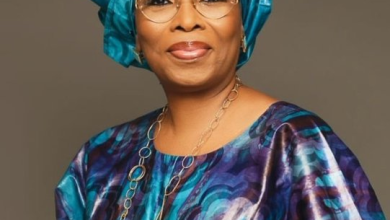
|
Getting your Trinity Audio player ready...
|
The utterances of President Muhammadu Buhari, the 15th president of the Federal Republic of Nigeria, inspired this topic. He said his wife belongs to his kitchen, bedroom, and living room when answering a question about which political party his wife belongs to. No, this statement was not made in Nigeria; it was made internationally in Germany when he was asked what political party his wife belonged to.
The former president’s bold utterance publicly on a global stage represents his honest view of his wife and women in general. It has become clearer why he dissolved the First Lady’s office during his tenure—women do not belong to political offices.
African women are often portrayed as domesticated and docile creatures in a country where inclusion is still a struggle. Issues affecting women are often swept under the carpet and treated as irrelevant. A woman is respected by her marital status, number of children, and ability to sacrifice her happiness and career for the good of everyone but herself.
A widow or deceased woman gets more honour and sympathy in African society than a divorced woman. Come on, are you trying to tell me you left your husband because of an ordinary beating? Oh please, my husband beat me a couple of times, and I stayed. Now, we are a power couple. Or don’t you know it is your job as a woman to hold her home down in sickness and in health, in beating and cheating, till death does you part?
Cultures influenced by Islamic religions are largely misogynistic
African society is deeply rooted in cultures and religions, be it traditional religion, Christianity or Islam. All these religions have one thing in common, which is women’s subjugation. In a religion where 95% of the rules are made and interpreted by men, it is easy for them to make rules that oppress women and support their fellow men, even in grievous cases like abuse, and then call it culture or doctrine.
“My uncle told me that all husbands beat their wives, and my uncle’s wife added that her husband often beat her. I said my uncle was a respected Sheikh, well versed with the teachings of religion, and he, therefore, could not possibly be in the habit of beating his wife. She replied that it was precisely men well versed in their religion who beat their wives. The precepts of religion permitted such punishment. A virtuous woman was not supposed to complain about her husband. Her duty was perfect obedience” (El Saadawi, 46–47) in Woman at Point Zero.
The above statement means that Islam, a religion practised by a large percentage of African countries, permits wife battering and relegating women to the background. The conversation is between a child bride who ran away from her abusive marriage. Still, her uncle and aunt convince her that woman battery is standard and even a respectable thing in their religion, which is the highest level of religious idiosyncrasy and the illusion of religious piety. In as much as Islam claims to be rooted in love and kindness, that love and kindness does not extend to women.
African women are often portrayed as domesticated and docile creatures in a country where inclusion is still a struggle. Issues affecting women are often swept under the carpet and treated as irrelevant. A woman is accorded respect by her marital status, number of children, and ability to sacrifice her happiness and career for the good of everyone but herself.
According to Marmduk Pickthall’s The Quran Translation,
“Men are in charge of women…so good women are the obedient…banish them to bed apart, and scourge them. Then if they obey, seek not a way against them” (110). It is now glaring that the Quran permits the beating of wives as punishment if they disobey. It is no surprise that Section 55(1)(d) of the Penal Code (applicable in Northern Nigeria makes it lawful for a man to beat his wife for the purpose of “correcting” her.
Research also shows that the oppression of women in the patriarchal African society is in consonance with the position of Islamic law in several parts of the continent. Chioma Opara also notes this in her observation thus: Women’s experience…owes its peculiarity to the predominantly Muslim society. The low status of Islamic women is evidenced by the repressive masculine dominance. These women have little or no say in the family, where the father is the authority figure or in the sex-segregated community where the female gender is viewed as a tabula rasa (160).
Opara goes further to point out that: …The Koran advocates the relegation of women to the private scene to perform the more sacred and vital role of wife and mother. Women’s education is thus a rarity in Northern Nigeria…Against this bridging background, Alkali presents tortuous female realities and dreams in The Stillborn and The Virtuous Woman (161). Northern parts of Nigeria and Africa at large are dominated by the Islamic religion. This religion permits men, especially those who are versed in the religion, to oppress women.
Few Laws that Discriminate against women in Nigeria
The Criminal Code Act of Nigeria classifies indecent assault of women and girls as a “misdemeanour” (a lesser offence), unlike a felony when the same act is committed on a male. A felony is the most grievous kind of offence under the Code.
Under the Nigeria Criminal Code Act, it is completely legal for a man to rape his wife, making Marital Rape just as legal as the right to life. Married women are prohibited from enlisting in the Nigeria Police Force under Regulation 118 of the Nigeria Police Regulations. It took several court battles for married Nigerian women to independently obtain an international passport in 2009. Before the court ruling in 2009, a married Nigerian woman would require a letter of consent from her husband to obtain or renew her international passport.
Women were also not allowed to vote or be voted for in elections in Northern Nigeria disenfranchising women in the most populated part of Nigeria where women accounted for 65% of the population, this was eventually stopped in 1979. The Labor Act of Nigeria prohibits women employed in industries from working night shifts.
Women have been trained in our culture and society to ask for what we want instead of taking what we want. We have been indoctrinated with this culture of permission, but that time has passed. We are taking up space and demanding the change we deserve. A woman is not a piece of furniture that you can place in your living room. Women are not sex toys for your sexual pleasures in your other room. Women are not cooking utensils that belong to your kitchen.
A woman’s place is everywhere!






